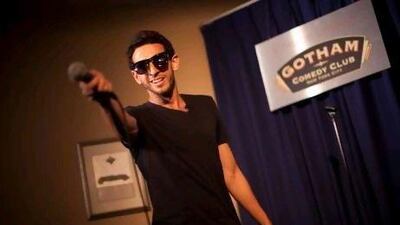In the basement lounge of the Gotham Comedy Club in Chelsea, Arabs are doing something you won't often see in the western media cycle: laughing. The host, the comedian Sammy Obeid, has the mic. "I'm Lebanese-American," he riffs. "And you know what they say about Lebanese-Americans - nothing!" Ba-dum-bum.
The room is sold out for the first night of the ninth annual New York Arab American Comedy Festival. Obeid works the room with another targeted gag about how his "roommate is Jewish, so we're always fighting about where my room ends". This Rising Stars show featured young talent of Jordanian, Palestinian, Egyptian, Syrian, Saudi Arabian and, yes, Lebanese extraction. The festival, which ended on Saturday, also presented three headlining acts, starring more experienced names. Mike Batayeh, a Jordanian living in Detroit, presented his The Haram Show which is known colloquially as The Nasty Show.
But this, of course, is not just another Thursday night of laughs in Manhattan. There is something deeper at work in the cultural engine room: misperceptions to be recalibrated and outreach to be accomplished. According to a 2011 study by the Arab American Institute in Washington, entitled The American Divide: How We View Arabs and Muslims, and reported in The Washington Post, "41 per cent of Americans had unfavourable views of Muslims, compared to 40 per cent who held favourable views".
So jokes will be told. Because it's hard to hate someone when you're laughing.
"A lot of people here in America don't think Arabs have a sense of humour," Batayeh says. "And any time you see one on CNN, they find the angriest person to put on camera, with a burning flag.
"Sort of like how any time they do a story on an American, they find the most ignorant person."
The festival's co-creator and producer Maysoon Zayid emphasises that the talent and ethnicity on offer spans "from Egypt to … Minnesota". She and Dean Obeidallah founded the festival in 2004. "Dean and I were doing standup before 9/11. Now, when you have the word 'Arab' in the news, it's always in a negative context. So we're always trying to re-educate the industry, that Arabs were the OGs [Original Gangstas] of comedy - Danny Thomas, Jamie Farr, all these guys." The New York Times and PBS have covered the festival and Zayid says movies and TV shows have been spun off from it, including You Don't Mess With the Zohan and Monk, starring Tony Shalhoub.
She concedes that the struggle remains. "We're at the mercy of the general news cycle. It's the only festival in the world that gets affected by a car bombing in Beirut." But she is enthusiastically clapping and cheering along on the night. "These kids flew themselves in. In the early years, we were begging people who were 1/16th Syrian to perform - now, we're turning them away."
Iraqi Luai Hodi is greeted by ululations - whether ironic or genuine - and riffs mainly on dating and the single life. The Jordanian Raad Missmar sounds like a Southerner - meaning the US, not Yemen. He grew up in the Washington, DC area. Hisham Fageeh announces he's a Saudi to cheers and pulls the "really?" face, before asking: "Have you been there?"
Nader Uthman, a Palestinian, wonders why "the most beautiful Lebanese women are the men".
Jameelah Shelo, a Palestinian from Chicago, is not the only comedian who mentions "marriage" and "cousins" in the same sentence and gets mildly risqué on Saudi girls showing a little hair under the veil: "The hijab says: 'I'm religious' but the bangs say: 'I'm available.'"
Later, Murad Saleh proved to be a genuinely strange Palestinian, taking to the stage with one sock and one bare foot.
These, of course, are up-and-comers - raw, with little experience and taking on the most psychically risky job in public performance. And a lot of this, necessarily, is "in the family" - a way for a marginalised or even demonised minority to hear its own voices and stories in a forum they're not generally associated with in the US.
Ultimately, the evening belongs to Obeid, who wins less with community solidarity than with comedy.
"I've read that a billion of the world's people live on one dollar a day," he says. "Why can't one of them be my girlfriend?"
He transcends issues of race, ethnicity, even culture and scores with gags and timing that would reach any audience - although he's no less pointed. Airport security makes Arabs take off their shoes "to make us feel at home" he jokes, before noting "I don't think anyone liked us before 9/11".
But on this Thursday night in Manhattan, he laughs last.

